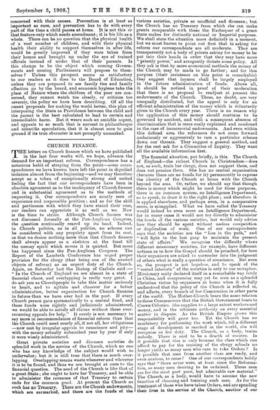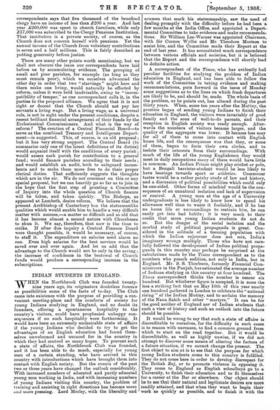CHURCH FINANCE.
THE letters on Church finance which we have published in the last four weeks will, we hope, advance the demand for an important reform. Correspondence has a notorious habit of straying from the point—some corre- spondences we have known have left the point in dignified isolation almost from the beginning—and we may therefore accept as a token of exceptionally strong and united feeling the fact that our correspondents have been in absolute agreement as to the inadequacy of Church finance and in substantial agreement as to the methods of improving it. Our correspondents are mostly men of experience and responsible position ; and as for the skill and pertinence with which they have stated their case, our readers can appreciate it as well as we. Now is the time to strike. Although Church finance was not discussed formally at the Pan-Anglican Congress, the question continually reared up its head. Indeed, in Church politics, as in all politics, no scheme can be considered with any propriety apart from its cost, so that we desire nothing more than that Church finance shall always appear as a. skeleton at the feast till the uneasy spirit which moves it is quieted. But more has happened since the Pan-Anglican Congress. The Report of the Lambeth Conference has urged proper provision for the clergy (that being one of the avowed objects of reform) as an urgent duty of the Church. Again, on Saturday last the Bishop of Carlisle said :- " In the Church of England we are almost in a state of financial chaos, and overlapping is really very great. I do ask you as Churclipeople to take this matter seriously to heart, and to agitate and clamour for a better administration, better organisation for Church finances in future than we have ever had in the past. If every Church person gave systematically to a central fund, and these funds were rightly and judiciously administered, we would be able to satisfy all claims without these ever- recurring appeals for help." It surely is not necessary to say more in recommendation of financial reform than that the Church could meet nearly all, if not all, her obligations —now met by irregular appeals to conscience and pity— with the money actually subscribed year by year if only it were wisely administered.
Great private societies and diocesan societies do splendid work in the service of the Church, which no one who has any knowledge of the subject would wish to undervalue; but it is still true that there is much over- lapping. Overlapping means waste whenever and wherever it is to be found, and thus we are brought at once to the financial question. The need of the Church is like that of a great State ; she ought to have her Treasury, and be able to administer the revenues of that Treasury to certain ends for the common good. At present the Church as such has no Treasury. There are the Church endowments, which are earmarked, and there are the funds of the
various societies, private or unofficial and diocesan ; but the Church has no Treasury from which she can make grants comparable with those the Exchequer of a great State makes for distinctly national or Imperial purposes. We shall state the situation more definitely in a moment, but we must hasten to point out first that in asking for reform our correspondents are all moderate. They are transparently not a body of priests asking for money to be put into their hands in order that they may have more " priestly power," and arrogantly dictate some policy. All they ask is that by more economical methods the money of the Church may be made to go farther ; and for this purpose (their insistence on this point is remarkable) they suggest that laymen shall be largely employed in the future administration of funds. Above all, it should be noticed in proof of their moderation that there is no proposal to readjust at present the endowments of the Church. These, no doubt, are very unequally distributed, but the appeal is only for an efficient administration of the money which is voluntarily given to the Church every year. There is no reason why the application of this money should continue to be governed by accident, and with a consequent absence of discrimination that is more easily explained and condoned in the case of immemorial endowments. And even within this defined area, the reformers do not come forward. audaciously or aggressively to ram a particular scheme down our throats. They suggest a general method, and for the rest ask for a Committee of Inquiry. They want all the available information first.
The financial situation, put briefly, is this. The Church of England—the richest Church in Christendom—does not, as such, train her clergy, does not support them, and does not pension them. She has no central organisation (because there are no funds for it) permanently to express the identity of the Church at home with the Church beyond the seas. Or, rather, we should say that though there is money which might be used for these purposes, there is no common system, no Intelligence Department, so to speak, to draw it to the right place ; and therefore it is applied elsewhere, and perhaps even, in a comparative sense, is misapplied. What we have called the Treasury would indeed be even more an Intelligence Department, for in many cases it would not try directly to administer the funds of the various societies, but would only advise how they should be spent without useless competition or duplication of work. One of our correspondents says that the societies are the " lion in the path," and " will fight to the last gasp to maintain the present state of affairs." We recognise the difficulty where different missionary societies, for example, have different notions as to how the Gospel should be preached, for here their organisers are asked to surrender into the judgment of others what is really a question of conscience. But even so, the prospect is not hopeless, and to speak of the "vested interests" of the societies is only to use metaphor. Missionary unity declared itself iu a remarkable way lately in China, and compromise may yet be seen as a splendid Christian virtue by organisers at home when it is fully understood that the policy of the Church is reflected in, and affects, every branch of her Communion in other parts of the world. The Mother-Church bears the same relation to these Communions that the British Government bears to Crown Colonies. She supplies to a large extent workers and money, and is the ultimate authority on every essential matter in dispute. As the British Empire grows this responsibility will grow too. Yet the Church has no machinery for performing the work which, till a different stage of development is reached in the world, she will. recognise as her duty. The Church, as a body, trains nobody. There is said to be a dearth of curates. Is it possible that this is only because the class which can afford to pay for the training of the clergy schools no longer yields so many men who care to take Orders ? Is it possible that men from another class are ready, and even anxious, to come? One of our correspondents boldly says that " there never were, at least since the Reforma- tio'n, so many men desiring to be ordained. These men are for the most part poor, but admirable raw material." The Church, as a body, would have to assume the new function of choosing and training such men. As for the treatment of those who have taken Orders, and are spending their lives in the service of the Church, another of our correspondents says that five thousand of the beneficed clergy have an income of less than £200 a year. And last year £260,000 was spent in church furniture, while only £17,000 was subscribed to the Clergy Pensions Institution. That institution is a private society, of course, as the Church does not concern herself with pensions. Yet the annual income of the Church from voluntary contributions is seven and a half millions. This is fairly described as putting generosity before justice. • There are many other points worth mentioning, but we shall not obscure the issue our correspondents have laid before us by accumulating evidence. The grouping of small and poor parishes, for example (so long as they must remain poor), which we ourselves advocated the other day in order that two " starvings " might here and there make one living, would naturally be effected by reform, unless it were held inadvisable, owing to " incom- patibility of temper," as one correspondent calls it, in the parties to the proposed alliance. We agree that it is not right or decent that the Church should not pay her servants a living wage. But a living wage, as a universal rule, is not in sight under the present conditions, despite a recent brilliant financial arrangement of their funds by the Ecclesiastical Commissioners. And what is the way of reform ? The creation of a Central Financial Board—to serve as the combined Treasury and Intelligence Depart- ment—is suggested. This, of course, is an old proposal ; but it has very strong support. The Central Board (to summarise only one of the latest definitions of its duties) would acquaint itself with the conditions of every parish ; would assess each parish for contribution to a general fund; would finance parishes according to their needs ; and would establish an audit, both to safeguard incum- bents and to make them more free to do their proper clerical duties. That sufficiently suggests the thoughts which are in the air. We do not comment on this or any special proposal, but we can heartily go so far as to join in the hope that the first step of granting a Committee of Inquiry into the whole question of Church finance will be taken, and taken quickly. The Bishops, as appeared at Lambeth, desire reform. We believe that the present Archbishop of Canterbury has the statesmanlike qualities which would enable him to handle a very difficult matter with success,—a matter so difficult and so old that it has become almost a second nature with Churchmen to shun it. We say, therefore, that now is the time to strike. If after due inquiry a Central Finance Board were thought possible, it would be necessary, of course, to staff it. The expenditure on salaries need alarm no one. Even high salaries for the best services would be saved over and over again. And let us add that the advantage to the Church would not be only in the saving ; the increase of confidence in the bestowal of Church funds would produce a corresponding increase in the subscriptions.







































 Previous page
Previous page